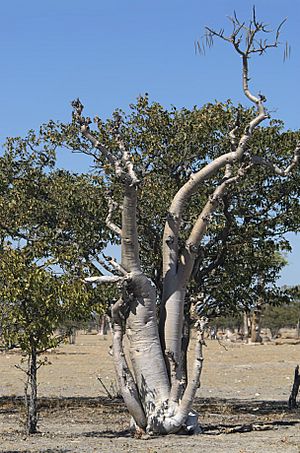Moringa facts for kids
Quick facts for kids Moringa |
|
|---|---|
 |
|
| M. ovalifolia in Namibia | |
| Scientific classification |
|
| Kingdom: | Plantae |
| Clade: | Tracheophytes |
| Clade: | Angiosperms |
| Clade: | Eudicots |
| Clade: | Rosids |
| Order: | Brassicales |
| Family: | Moringaceae Martinov |
| Genus: | Moringa Adans. |
| Type species | |
| Moringa oleifera |
|
| Species | |
|
See text |
|
| Synonyms | |
|
Donaldsonia Baker f. |
|
Moringa is a special group of flowering plants. These plants are found naturally in parts of Africa and Asia. Moringa is the only genus (a group of similar species) in its plant family, called Moringaceae.
The name Moringa comes from "murungai," which is the Tamil word for drumstick. That's why these plants are often called "drumstick trees." There are 13 different types, or species, of Moringa. They grow in warm, tropical and subtropical areas. These plants can be tiny herbs or very large trees. Moringa species grow super fast in many different places.
The most famous Moringa plant is Moringa oleifera. It comes from the Himalayas mountains in northwestern India. People grow this amazing tree all over the world. It's used as a dietary supplement, a health food, and in herbal practices. The long, thin fruit pods of Moringa oleifera are called "drumsticks." They are eaten as food in many countries, especially in South Asia. People also use the leaves to make tea. You can even make oil from the seeds and powders from the leaves and roots.
Another type, M. stenopetala, grows in Africa. It's also widely grown, but not as much as M. oleifera.
Contents
What Moringa Looks Like
Moringa plants are very diverse. They can be small shrubs or huge, thick-trunked trees.
How Moringa Grows
Moringa plants have many different ways of growing. Here are some main types:
- Bottle trees: These trees have thick, swollen trunks, like a bottle. Examples include M. drouhardii and M. ovalifolia.
- Slender trees: These are tall and thin trees, like M. oleifera.
- Shrubs with tubers: These are smaller bushes that have thick, root-like parts underground called tubers. M. pygmaea is an example.
Leaves
The leaves of Moringa plants are usually made up of many smaller leaflets. They have smooth edges.
Flowers
Moringa Flowers can be either symmetrical (like a star) or have symmetry on only one side (like a butterfly). Bottle trees usually have small, star-shaped flowers. Most Moringa flowers are white, cream, or brown. But M. longituba is special because it has bright red flowers!
Fruit
The fruits are usually long, thin "pods." They look a bit like a long bean pod. The fruits of M. oleifera are the famous "drumsticks." They are a very important food in India. People eat them as a vegetable and use them in traditional medicine.
Moringa's Family Tree
The Moringa family (Moringaceae) is part of a larger group of plants called Brassicales. This group also includes many common vegetables like broccoli and cabbage. Scientists use clues from the plants' shapes and even their DNA to figure out how they are related.
Scientists have found that Moringa has three main groups within it. One group, called Donaldsonia, includes the bottle trees. Another group, simply called Moringa, has most of the other species, including M. oleifera. The third group, Dysmoringa, only has one species, M. longituba, which stands out because of its unique red flowers.
List of Moringa Species
Here are some of the different types of Moringa plants:
- Moringa arborea (found in Kenya)
- Moringa borziana (found in Somalia)
- Moringa concanensis (found in northern India)
- Moringa drouhardii – a bottle tree (found in southwestern Madagascar)
- Moringa hildebrandtii – Hildebrandt's moringa (found in southwestern Madagascar)
- Moringa longituba (found in Ethiopia and Somalia)
- Moringa oleifera – the horseradish tree (found in northwestern India)
- Moringa ovalifolia (found in Namibia and Angola)
- Moringa peregrina (found in the Arabian Peninsula, Horn of Africa, and southern Sinai, Egypt)
- Moringa pygmaea (found in Somalia)
- Moringa rivae (found in Kenya and Ethiopia)
- Moringa ruspoliana (found in Ethiopia)
- Moringa stenopetala (found in Kenya and Ethiopia)
Images for kids


